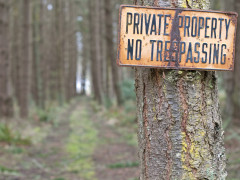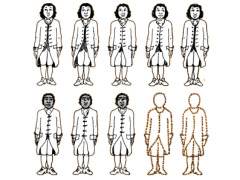According to Thomas Aquinas, private property did not exist in Paradise but arose only later, after the original sin of Adam and Eve and their expulsion from Eden. Why private property is absent in Paradise and what this tells us about Aquinas’s understanding of private property is the subject of this post and those that follow.
[You can download the full essay here: No Property in Paradise: How Aquinas Understands the Origin of Private Property or read the topics in the series include in order: 1. No property in Paradise, 2. Life in Paradise, 3. No Labor in Paradise, 4. Sexuality and Procreation in Paradise, 5. The Children of Adam and Eve, 6. Were Adam and Eve Vegetarians? 7. No Equality in Paradise, 8. Subjection and Government in Paradise, 9. Private Property, the Result of Sin, 10. Aquinas’s Analogy: Clothing, Slavery and Private Property]
This discussion continues a series of posts I’ve done recently on Aquinas’s conception of private property after the human expulsion from Paradise. As we have already seen, Aquinas takes up the legitimacy of private property in his discussion of “theft and robbery,” since those unlawful acts assume the legitimacy of private property in the post-Paradise situation or what scholars like to call the “postlapsarian” condition. Aquinas holds the view that although private property is not natural, it is a reasonable and even necessary human institution in the post-Paradise human condition.
But how and why did private property develop given that there was no private property in Paradise? Aquinas accepts the view already established by his time that “according to the natural law all things are common property.”[1]ST 2a2æ 66, II (II-II, 66, ii), See text and my discussion beginning here. As we shall see below, he also attributes this view to St. Isidore If so, then what is it about the post-Paradise human condition that made the need for private property arise? And why is this change in the human condition greeted as a necessary and good extension of the nature, whereas other changes in the human being are considered punishments? What, furthermore, does this development tell us about Aquinas and his conception of private property? These are some of the questions that we shall attempt to tackle in this discussion.
We shall start with the observation that if private property is the conceptual foundation for the idea of theft and robbery, then the lack of private property in Paradise must mean that theft and robbery were not possible or not an issue in Paradise. This might seem like a self-evident and even banal conclusion. After all, why would Adam and Eve want or need to steal from each other? The original couple had plenty of everything available to them whenever they wanted. But the issue is not so simple, as we shall see, for the human species could have grown and enlarged in Paradise had the first couple not sinned. Indeed, Aquinas holds that there would have been procreation and offspring in Paradise had the first couple not sinned.[2]I discuss the sources of this view below and will return to this point. We are thus led to the theoretical possibility that there could have eventually been hundreds, thousands and eventually millions of human beings living in Paradise, had the first sins not occurred. What, then?
With an expanded human population in Paradise, would competition over resources have arisen and triggered a need for private property in Paradise? And if not, why not? These are not unreasonable hypothetical questions, since Aquinas holds the view that Adam and Eve had free will and it was not ordained that they must sin and be expelled from the garden. Thus, it is reasonable to ask what would have happened had they not sinned? In this situation, would private property have arisen? These questions open up a much larger discussion about the differences in the human condition before and after life in Paradise. It is in this context that we ultimately need to come to terms with Aquinas’s understanding of private property.
Next: Life in Paradise: Food, Immortality and Sexuality
References




